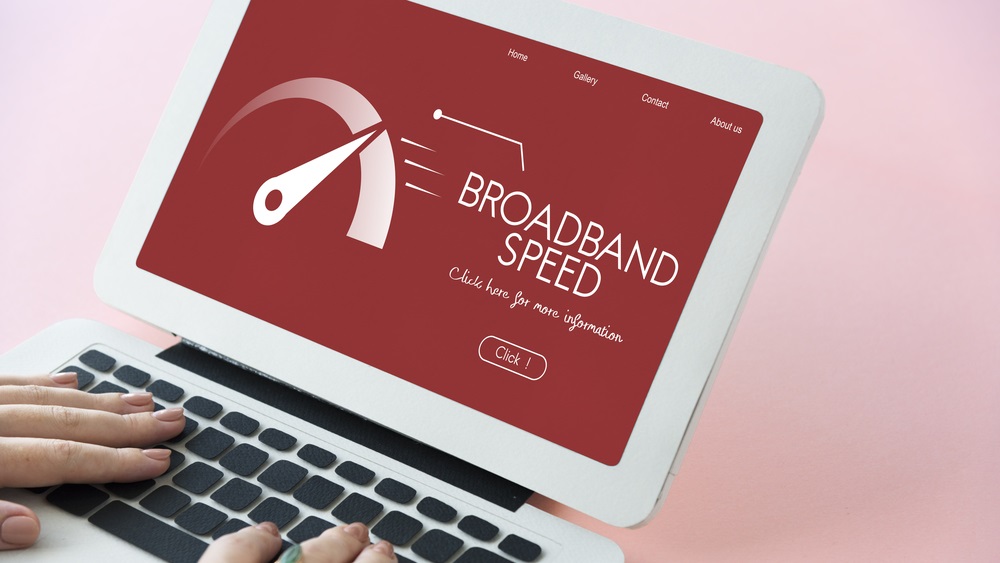
Looking at the best broadband deals on the market and noticed that you're eligible to receive 'symmetrical broadband speeds'? If so, you may have questions about what this means for you, or whether these deals are worth the additional cost.
Put simply, symmetrical upload and download speeds are exactly what they sound like. So, a 500Mbps fibre package that offers symmetrical download speeds will offer you download and upload speeds that are both 500Mbps.
The most notable example of a symmetrical broadband package that's on the market at the moment is Virgin Media's Gig2 package. Customers who buy an upgrade can enjoy symmetrical upload and download speeds of two gigabits per second!
However, the reality remains that the majority of connections you see on the market are 'asymmetrical'. This means that although this same package would offer you the same download speeds, the upload speeds you'd receive would be much lower.
Keen to learn more about exactly what symmetrical broadband speeds are and how they can benefit you? We’ve pulled together this in-depth guide.
What are symmetrical broadband speeds?
As we mentioned above, ‘symmetrical speeds’ mean that your download bandwidth and your upload bandwidth are the same. So, if your internet package offers you average download speeds of 100Mbps and your line is symmetrical, then your upload speeds will also be 100Mbps.
If your line is asymmetrical, your upload speeds will be a fraction of this. For example, if you take out the same 100Mbps package, then your upload speeds may only be 20-30Mbps. That's a noticeable difference.
However, the reality is that upload speeds of 20-30Mbps are enough for most people. However, if you regularly game online, stream gameplay or upload large files to the cloud, then you may find that these speeds are simply too slow for your needs. This will be the case if your files take an incredibly long time to upload, or if you start to suffer from lag while gaming.
If this applies to you, then it's well worth considering a symmetrical package that will boost your upload speeds.

What are upload speeds and download speeds?
Before we dive into why upload speeds are so important and how symmetrical speeds can help you, let’s first clarify exactly what we mean by upload speeds and download speeds, so you can be clear on what each one does:
- Download speeds are how quickly you can access the internet. If you have fast download speeds, webpages will load in an instant and you’ll never encounter buffering when you’re watching YouTube videos or Netflix shows.
- Upload speeds are how quickly you can share something on the internet. The quicker your upload speeds, the faster you’ll be able to share a post on social media, upload a file to Google Drive, or participate in a video meeting for work.
It's likely you've never really considered the importance of upload speeds before, and this is understandable. After all, broadband providers regularly only advertise their download speeds as this is the more well-known of the two. People tend to understand that the higher the average download speed, the more quickly they'll be able to download large files or stream media.
But, even though downloading is more common and the figure provided can be more eye-catching, there are now more reasons than ever for people to require their internet connection to provide them with good upload speeds.
This is particularly the case because more people are working from home than ever before and now rely on video calling, which requires high upload speeds and download speeds. But, upload speeds don't just help you work more smartly, they also help you enjoy your downtime even more. This is because a good upload speed is very helpful if you love playing video games online with your friends, or if you want to upload all your family photos to the cloud so you don't lose them.
Why are upload speeds important?
Internet service providers typically advertise their download speeds. This is because most people are interested in these speeds because the majority of devices pull data down from the internet. For example, quick download speeds are vital if you want to watch your favourite shows on Netflix, stream music, or play your favourite games online.
However, while many devices pull data down from the internet, others push data up to the internet. This happens if you upload a file to your Google Drive, if you’re attaching a document to an email or if you’re gaming online or streaming your gameplay.
Plus, upload speeds are also vital if you work from home and use video conferencing. This is because bits of software such as Zoom or Microsoft Teams rely on both upload speeds and download speeds to send and receive data. If your upload speeds are poor, the person on the other end will likely glitch and may be inaudible.
On top of this, if you have a wireless home security system that includes cameras, then upload speeds are essential for making sure this system works correctly. This is because these devices allow you to stream the movement they capture when you’re not at home and this requires impressive upload speeds; especially if you want to stream in HD.

What is a good upload speed?
The exact upload speed you’ll need will depend on how you’re using the internet. If you live in a small home on your own or you only use the internet to scroll social media and update your emails, then low upload speeds of around 2Mbps will likely be fine.
However, if you work from home, you’ll struggle to be productive with these speeds and you’re likely going to need speeds of around 10Mbps. Otherwise, you’ll struggle to send emails with large attachments or participate in work calls.
That said, if you regularly need to share large files for work and you’re heavily reliant on video meetings, you should aim for upload speeds of around 20Mbps. These speeds are also appropriate for online gamers and live streamers.

Pros of symmetrical broadband speeds
As you may expect, opting for symmetrical upload and download speeds can provide you with a number of benefits.
For example, with higher upload speeds, you'll be able to upload large files faster. This makes it far easier for you to keep your family photo collection up-to-date, keep any of your current projects secure, or send emails with large attachments.
This is particularly important if you use cloud-based storage for work and find that you're very unproductive because the upload process takes a long time. It's also important if you're a content creator who is regularly uploading TikTok videos or videos to YouTube.
Added to this, if you notice slow uploads and calls dropping out with your current connection, then this may be because your data is getting 'clogged' due to a lack of available bandwidth in high-traffic periods. Again, this can lead to a drop in productivity if you work from home regularly. With symmetrical broadband speeds, your upload speeds should never be strained due to high use, so you can work seamlessly and without interruption.
Plus, as more companies move to cloud-based storage systems, the ability to reach the cloud will only become more important. Reliably accessing the cloud when you need to requires high upload speeds. So, by choosing symmetrical broadband speeds, you will guarantee that your cloud services are always available.

Negatives of symmetrical broadband speeds
As you may expect though, there are also negatives associated with symmetrical broadband speeds, including the price. It's almost always less expensive to choose an asymmetric broadband connection, which may be right for you if you're not regularly uploading files or going on video calls.
Similarly, you won't receive an improvement in the average download speeds you're receiving if you choose a symmetrical connection. If download speeds are a priority for you, then you may be better off paying extra for a package that offers higher download speeds rather than one that offers symmetrical speeds.
Which providers offer symmetrical speeds?
Sadly, not all broadband providers offer symmetrical broadband (in fact, the majority don't). So, you shouldn’t just assume that your upload speeds will match your download speeds. When you do the research, you'll often find that a lot of providers offer upload speeds that are much slower than the advertised download speeds.
For example, Sky’s incredibly popular Ultrafast+ package offers a minimum download speed guarantee of 400Mbps but only offers estimated upload speeds of 58-60Mbps.
Any provider that uses the Openreach network (for example BT, Sky and Plusnet) cannot offer symmetrical speeds at the moment. Plus, even though Openreach is in the process of upgrading its network to provide Ultrafast Full Fibre Broadband to 25 million homes and businesses, this upgraded network still will not provide symmetrical broadband speeds. This is because Openreach's Ultrafast Full Fibre Broadband provides download speeds of up to 1,000Mbps, but only provides upload speeds of up to 220Mbps.
Thankfully, in the past couple of years, a number of the smaller broadband providers that utilise their own fibre networks, like Grain and Hyperoptic have expanded their rollout of symmetrical broadband speeds. Other providers to look at include Gigaclear and Community Fibre (if you live in London).
Symmetrical speeds are something that Virgin Media currently offers via its Gig2 package. For an extra fee, customers can access symmetrical download speeds of 2Gbps. In the coming years, Virgin wants to build on this even further. By 2028, the company hopes to provide symmetrical 10Gbps download and upload speeds to all of its customers.

Do I actually need symmetrical speeds?
Whether or not you need symmetrical speeds will depend on how you use the internet. So, let’s start by saying that if you only use the internet to send emails, check your social media, or browse the web, you probably don’t need symmetrical speeds. But, it’s increasingly rare that people only use the internet for these purposes.
If you work from home, regularly upload files, or rely on your internet connection for your home security system, then symmetrical speeds will likely be essential. This is because all your uploading and downloading will happen instantly, so you’ll find it easy to check your cameras, take part in work calls, and upload files/share content with your clients.
For context, if your upload speed is 10Mbps, it will take 15 minutes to upload a 1GB video and share it with a client. By contrast, if your upload speeds measure 300Mbps, the same upload will only take 30 seconds!
On top of this, symmetrical speeds guarantee that you never lose bandwidth when you’re uploading and downloading at the same time. This means you can gather lots of information for a work project at the same time as uploading all of your family holiday photos to your cloud storage solution. Without symmetrical speeds, this would be near impossible.
Looking for increased upload speeds? Switch provider today
Changes to our online habits in recent years have increased our demands for good upload speeds. After all, working from home, online gaming and livestreaming have all completely changed the way many of us engage with the internet.
If you regularly upload content, then you may find that your current package struggles. Want to switch to a new package that provides you with faster upload speeds? Simply visit our best broadband deals page or pop your postcode into the tool below. We’ll then show you the best broadband deals in your area.
Get daily insight, inspiration and deals in your inbox
Sign up for breaking news, reviews, opinion, top tech deals, and more.
Tom is a freelance copywriter and content marketer with over a decade of experience. Originally from an agency background, he is proud to have worked on campaigns for a number of energy providers, comparison sites and consumer brands.
